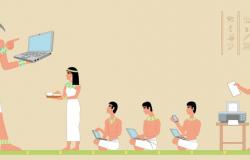– AI, the woes of efficiency
Are robots killing the joy of the creative process?
Published today at 8:37 a.m.
Subscribe now and enjoy the audio playback feature.
BotTalk
Last week, Apple announced the launch of its new artificial intelligence system. Optimized in partnership with OpenAI, its smartphones will be even smarter and able to anticipate your desires. “We believe that Apple Intelligence will become indispensable to products that already have an essential role in our lives,” predicted Tim Cook.
Given the rate at which AI is establishing itself in our daily lives – a rate inversely proportional to our ability to give it a legal framework – it is difficult to imagine that the boss of Apple is wrong. Text, sound, image, logistical or information flows, AI is already everywhere. In the dense online file that “Forbes» devotes to the subject, we learn that the sector should weigh no less than 407 billion by 2027. Dizzying prospects, accompanied by a lot of concerns: at the top of the list, the people surveyed by the magazine mention the proliferation of deep fakesthreats to employment, invasion of the private sphere or even the fear that the tool will escape us (you know: Skynet, Terminator, the end of the human species, all that).
To this list of speculative terrors, we could add a danger already well at work, a more insidious question: is artificial intelligence, by dint of carrying out “ungrateful” tasks for us, not in the process of to kill the experience of the creative process? Having a robot do the job means assuming that only the result counts. That the path that leads us there is only a problem to be solved, an obstacle to be removed. Damage. To grope, to find out information, to make a mistake perhaps, to arrive at one’s destination through unsuspected means, is to learn things about the world, and about oneself. It’s potentially enjoyable, too. What do we lose by outsourcing all of this? Difficult to measure.
There is of course the idea that in an increasingly complex world, the phenomenal potential of AI is destined to liberate us. The small troop of Californian sociopaths to whom we have joyfully handed the reins of human destiny are in any case convinced of this. As were, before them, those who successively presented to the world the loom, the assembly line, the photocopier, electronic messaging… The cohorts of liberated workers thank them in chorus from the depths of the ages.
Artificial intelligence, as we know, draws on all of our work. They do what they are told, their “failures” are only a reflection of ours. Still according to “Forbes”, 97% of business owners think that ChatGPT will help their business grow. Knowing that the market is a big pie in which winners and losers must share the shares, that’s a lot of winners. The cake would benefit from knowing how to circumvent the laws of mathematics. Maybe ChatGPT will have an idea.
“The Tribune of Opinions”
With the Tribune of Opinions, find analyzes, editorials, readers’ letters, expert opinions… So much insight to form your own opinion every Monday.
Other newsletters
To log in
Gregory Wicky has been a journalist at 24 Heures since 2004. After having been responsible for editing the websites and that of the Samedi magazine, he is currently head of the Vaud section since 2018. More informations
Did you find an error? Please report it to us.
0 comments






